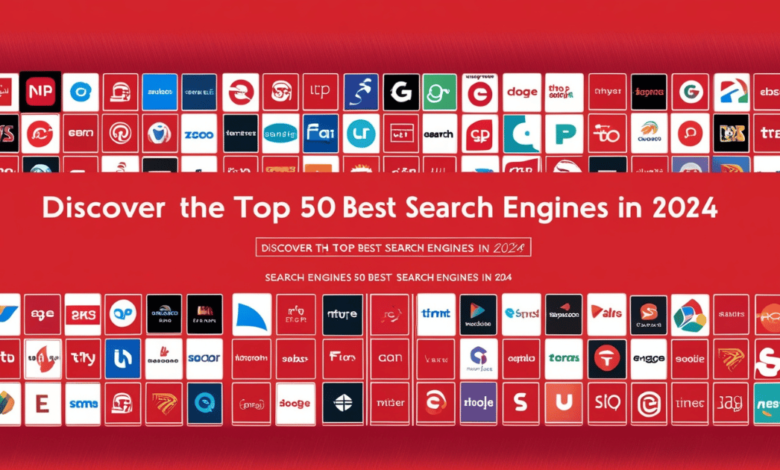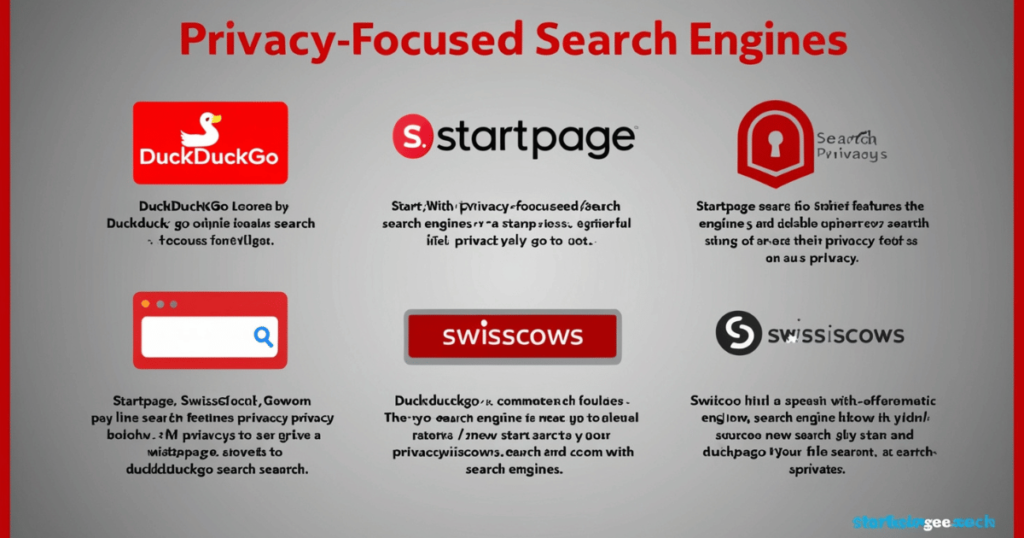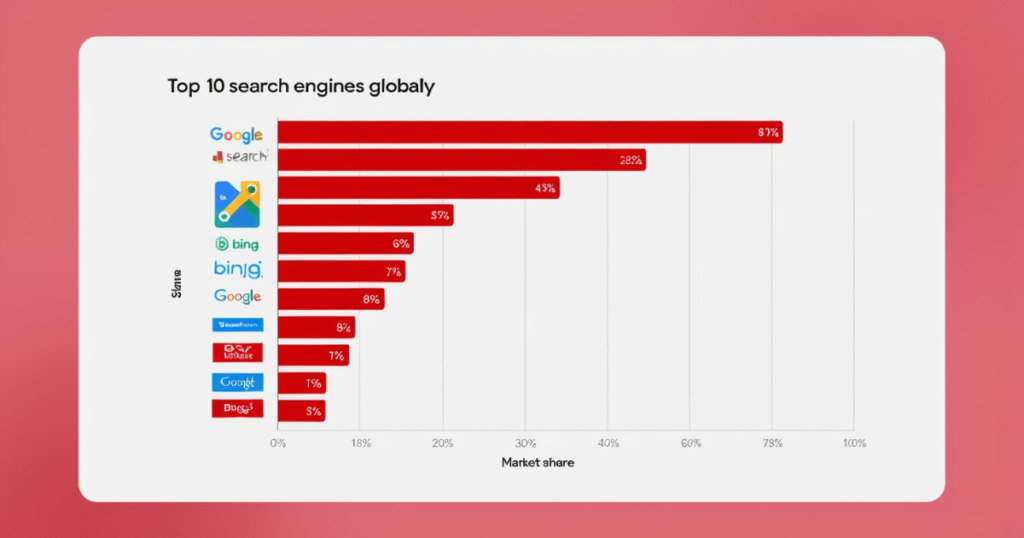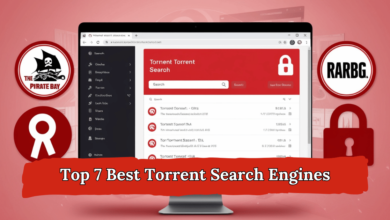
In today’s digital landscape, search engines are the gateway to the internet, helping us find information quickly and efficiently. While Google remains the undisputed king, there are many other powerful search engines worth exploring. In this article, we dive deep into the 50 best search engines that you need to know in 2024. Whether you are looking for privacy-focused options, region-specific engines, or niche search tools, this comprehensive list has something for everyone.
Table of Contents
Toggle50 Best Search Engines According to their Popularity

1. Google
The world’s most dominant search engine, Google handles over 8.5 billion searches per day. Users prefer Google for its precise search results, robust algorithms, and access to services like Google Maps and Gmail.
2. Bing
Bing, powered by Microsoft, provides unique features like Bing Visual Search and integration with Microsoft Office tools. It’s the default search engine on Windows devices and offers a rewards program for users.
3. Yahoo! Search
Yahoo! leverages Bing’s search technology but offers a different layout focused on news, sports, and entertainment. It is preferred by users who want a curated experience and up-to-date headlines.
4. Baidu
Baidu is China’s top search engine, specializing in Chinese language queries. It features unique tools like Baidu Baike (encyclopedia) and is the go-to search engine for content within China.
5. Yandex
Yandex dominates the Russian market, known for its strong localization and language processing. It offers services like Yandex Music and Yandex Maps, catering to Russian-speaking users.
6. DuckDuckGo
50 Best Search Engines: Famed for its privacy features, DuckDuckGo does not track user activity. It provides a safe, anonymous browsing experience without personalized ads.
7. Ecosia
Ecosia donates 80% of its profits to tree-planting projects, making it an eco-friendly choice for users. Its commitment to sustainability attracts environmentally conscious searchers.
8. Qwant
Qwant, a French search engine, prioritizes user privacy and offers a child-friendly version called Qwant Junior. It appeals to privacy-focused users in Europe.
9. Startpage
Startpage provides Google search results without tracking user data. It offers a proxy service for browsing websites privately.
10. Swisscows
Swisscows focuses on family-friendly search results and does not track user data. Its servers are located in privacy-friendly Switzerland, ensuring user data protection.
11. Mojeek
50 Best Search Engines: Mojeek is an independent search engine that builds its own index without relying on Google or Bing. It provides unbiased and unique search results.
12. WolframAlpha
WolframAlpha is known for its computational abilities. It answers factual queries directly and is popular in academic and research circles.
13. Brave Search
50 Best Search Engines: Developed by the makers of the Brave browser, Brave Search emphasizes privacy and ad-free results. It does not rely on Google’s index, offering a fresh take on search.
14. Ask.com
Ask.com operates on a question-and-answer format, ideal for users looking for straightforward responses to specific queries.
15. Dogpile
Dogpile aggregates search results from Google, Yahoo, and Bing, compiling the most relevant results in one place.
16. Blekko
50 Best Search Engines: Initially focused on user-curated search results, Blekko has now been integrated into IBM’s Watson, adding AI-driven features to search.
17. Sogou
Sogou, popular in China, is known for its language input tools and localized content. It caters to users familiar with Chinese language and culture.
18. Seznam.cz
Seznam.cz is a Czech search engine providing localized results, maps, and email services tailored to Czech users.
19. Gigablast
50 Best Search Engines: Gigablast is an open-source search engine known for its large index and privacy features. It offers a unique, non-tracking alternative.
20. Search Encrypt
50 Best Search Engines: Focused on privacy, Search Encrypt encrypts user search queries and browsing history, making it a choice for secure searching.
21. MetaGer
MetaGer is a German metasearch engine that prioritizes user privacy and aggregates results from different sources without tracking users.
22. Yippy
Yippy searches the deep web and specializes in finding content not indexed by mainstream search engines, ideal for academic research.
23. Neeva
50 Best Search Engines: Neeva offers an ad-free search experience with a subscription model. It focuses on providing unbiased and untracked search results.
24. Searx
50 Best Search Engines: Searx is an open-source, decentralized metasearch engine that aggregates results while maintaining strong privacy standards.
25. You.com
You.com focuses on customization and privacy, letting users tailor search results based on preferences and needs.
26. Peekier
Peekier provides previews of web pages before users click on them, offering a safer browsing experience by filtering malicious sites.
27. Infinity Search
50 Best Search Engines: Infinity Search emphasizes speed and privacy, offering decentralized search capabilities without user tracking.
28. Boardreader
50 Best Search Engines: Boardreader is a specialized search engine for forums and message boards, making it useful for finding niche community discussions.
29. The Internet Archive
50 Best Search Engines: The Internet Archive’s Wayback Machine allows users to view archived versions of web pages, a valuable tool for historical research.
30. Egeria
Egeria focuses on aggregating scholarly articles and research papers, catering to academic users and researchers.

31. Lycos
One of the oldest search engines, Lycos offers a range of services including email, web hosting, and social networking.
32. Exalead
50 Best Search Engines: Exalead provides enterprise-level search solutions and is used in industries for internal search functionalities.
33. Info.com
50 Best Search Engines: Info.com aggregates results from major search engines like Google and Bing, offering a comprehensive search experience.
34. Teoma
Acquired by Ask.com, Teoma was known for its unique search methodology focused on authority-based rankings.
35. Jive
Jive specializes in searching community and enterprise social networks, aiding in internal communication and knowledge management.
36. Altavista
50 Best Search Engines: Now defunct, AltaVista was one of the first search engines and helped pioneer many search features used today.
37. Go.com
Part of Disney, Go.com focuses on entertainment-related searches, providing results tailored to movies, TV shows, and games.
38. AllTheWeb
50 Best Search Engines: Acquired by Yahoo, AllTheWeb was known for its fast indexing and is now integrated into Yahoo’s search engine capabilities.
39. WebCrawler
WebCrawler is a metasearch engine combining results from Google, Yahoo, and Bing for a more complete search experience.
40. LookSmart
50 Best Search Engines: LookSmart is a niche search engine providing curated results, mainly used by small businesses for advertising.
41. Excite
Excite is a portal offering search, email, news, and weather updates, popular in the early 2000s.
42. Northern Light
Northern Light focuses on enterprise search, providing specialized solutions for businesses.
Check Also: AIO Search: The Ultimate Multi-Search Engine for Power Users
43. Gopher
50 Best Search Engines: Gopher offers a text-based search engine, primarily used in educational and research institutions.
44. WebTop
WebTop integrates search with desktop applications, focusing on productivity and efficiency.
45. KartOO
KartOO was a visual search engine, providing a unique map-like interface for exploring search results.
46. Baidu Baike
Part of Baidu, Baike is a Chinese-language encyclopedia similar to Wikipedia, integrated into Baidu’s search results.
47. HotBot
HotBot, once a major search engine, now provides privacy-focused search options using various engines.
48. Vivisimo
50 Best Search Engines: Vivisimo offers a clustering search engine, organizing results into categories for better navigation.
49. Magellan
Magellan was known for its review-based search results, a precursor to today’s ratings systems.
50. Naver
Naver is South Korea’s leading search engine, providing localized services like Naver News and Naver Maps.
Frequently Asked Questions (FAQs) about 50 Best Search Engines
1. What are the best search engines besides Google?
Apart from Google, the top search engines include Bing, Yahoo, DuckDuckGo, Baidu, and Ecosia. These search engines offer various unique features like privacy-focused searches (DuckDuckGo), eco-friendly browsing (Ecosia), and regional relevance (Baidu).
2. Why should I use alternative search engines?
Alternative search engines can provide features that Google may not offer, such as better privacy protection (DuckDuckGo), specialized academic results (Google Scholar), and tree-planting initiatives (Ecosia). They can also offer unbiased search results and cater to niche queries.
3. Which search engines prioritize user privacy?
Search engines like DuckDuckGo, Startpage, and Swisscows are privacy-focused, meaning they do not track user activity or store search histories. They provide secure and anonymous search experiences, making them ideal for privacy-conscious users.
4. What is a metasearch engine?
A metasearch engine aggregates search results from multiple search engines, displaying a combined list for users. Popular metasearch engines include Dogpile, MetaGer, and Searx, which pull results from sources like Google, Yahoo, and Bing.
5. How does Ecosia support the environment?
Ecosia donates a significant portion of its ad revenue to tree-planting projects. The company reports that it uses about 80% of its profits for reforestation efforts, making it a great choice for users who want to contribute to environmental sustainability.
6. What is the difference between Baidu and Google?
Baidu is the most popular search engine in China, tailored specifically for Chinese-language content and services. Unlike Google, Baidu focuses heavily on local Chinese internet needs, including unique features like Baidu Baike (an encyclopedia similar to Wikipedia) and integration with regional applications.
7. Which search engines are best for academic research?
Google Scholar, Microsoft Academic, and WolframAlpha are top choices for academic research. They provide access to scholarly articles, research papers, and scientific data, making them ideal for students, researchers, and educators.
8. Can search engines be used without ads?
Yes, ad-free search engines are available, such as Neeva, which offers a subscription-based model without advertisements. This can provide a cleaner search experience without targeted ads interrupting your queries.
9. Are there search engines specifically for images?
Yes, Google Images, Bing Visual Search, and Pinterest Lens specialize in image-based searches. They allow users to search using photos and offer advanced filters for finding specific visual content.
10. What is a deep web search engine?
Deep web search engines like Yippy and Gigablast allow users to access content that is not indexed by traditional search engines like Google. These search engines are often used for specialized queries and can provide access to hidden or lesser-known online resources.
11. How can I find niche-specific search engines?
Niche search engines cater to specific interests or industries. For example:
- Boardreader for forum content
- JSTOR for academic journals
- Creative Commons Search for free-to-use media
These tools offer tailored search experiences for users looking for specific types of information.
12. Is DuckDuckGo really private?
Yes, DuckDuckGo does not track or store user data. It uses encrypted search queries and does not share user information with advertisers, making it a top choice for private browsing.
13. What are some search engines used for regional content?
- Baidu: Popular in China for Chinese-language content.
- Yandex: Dominates in Russia and offers localized services.
- Naver: Widely used in South Korea, focusing on Korean-language results and services.
These search engines provide results tailored to specific regions and languages.
14. Are there search engines for kids?
Yes, Kiddle and KidRex are search engines designed specifically for children. They offer filtered content to ensure safe and child-friendly browsing experiences.
15. How do I choose the best search engine for my needs?
Consider what you value most: privacy, specialized content, regional results, or environmental impact. For privacy, try DuckDuckGo; for academic research, use Google Scholar; for eco-friendly choices, opt for Ecosia. Tailoring your search engine choice to your specific needs will provide a more efficient browsing experience.
Choosing the right search engine can make a significant difference in your browsing experience, depending on your specific needs, preferences, and values. While Google remains the dominant player, offering a vast index and advanced algorithms, exploring alternatives can open up more specialized and privacy-focused options. Search engines like DuckDuckGo provide a secure and private experience, Ecosia supports environmental causes, and regional giants like Baidu and Yandex offer localized search results tailored to their respective audiences.
For users interested in academic research, engines like Google Scholar and WolframAlpha deliver specialized knowledge and factual answers. Niche engines such as Boardreader and JSTOR cater to specific interests, while Kiddle ensures a safe browsing experience for children.
Ultimately, the “best” search engine depends on what you prioritize—whether it’s privacy, comprehensive academic resources, or an eco-friendly approach. By exploring the options listed in our comprehensive guide, you can find the search engine that best aligns with your needs and enhances your overall internet experience.



